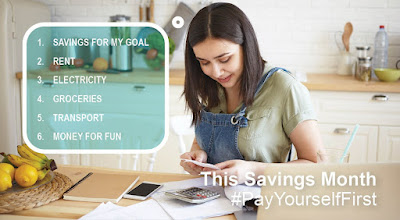Every
July, we are reminded of the importance of saving during Savings Month. Yet few
of us manage to fix our lack of savings. That’s why Smart About Money, an initiative by the Association for
Savings and Investment South Africa (ASISA), is campaigning for you to
#PayYourselfFirst.
Pay yourself first is a
budgeting technique that ensures you allocate a fixed amount to savings each
payday before you spend on anything else. Establishing this habit will help you
be disciplined and achieve your financial goals.
Start by working out what
you spend on essentials, such as accommodation, transport, electricity and
groceries. Then set a realistic amount within what is left of your income that
you can save every month.
If you leave saving until
the end of the month, you will be tempted to spend on non-essentials, such as
clothing, entertainment or eating out. You will then convince yourself that you
have no money left to save.
If you pay yourself
first, your savings are transferred from your account as soon as you are paid.
Soon, your contribution will feel like your other deductions or debit orders,
and you will learn to live without this money.
Pay yourself first
The key to paying
yourself first is to set up a separate savings account or investment, such as a
unit trust or exchange-traded fund (ETF), and automate a transfer or payment to
that account on the day you are paid.
For emergency savings or
short-term goals like a holiday or renovations, choose a savings account with a
fixed term aligned to your saving horizon.
For medium- to long-term
savings, consider a unit trust or ETF with potentially higher returns.
Giving your savings goal
a name, targeting an amount and working out how long you need to reach it, will
discourage you from raiding your savings.
Use tools like the Smart About Money Savings
Goal Calculator to determine how
much you need to save each month.
Even if your initial
savings are small, being aware of your goal should prevent impulse spending and
motivate you to increase your savings amount when your earnings improve or your
expenses reduce.
Setting goals
You can start small with just
one goal, but over time, you could set up several savings and investment
accounts tailored to different goals' timelines.
·
An emergency fund
Start with an emergency fund. An emergency fund helps you to stick to your
budget and not raid your savings when financial emergencies, such as injury or
illness, home or car repairs, arise.
·
A short-term goal
A short-term goal takes
between a year and three years to reach and provides for expenses such as an
appliance, a mini-holiday, a wedding or December expenses.
·
A medium-term goal
Save for bigger things, such as an overseas holiday, a wedding, a
deposit on a house or a car over three to ten years.
·
A long-term goal
Save for more than 10 years for bigger goals, such
as your retirement or your children’s tertiary education. Use the Smart About Money Retirement Savings calculator to work out how much you need to save, and consider a retirement annuity if your employer does not have a fund or you
need to supplement your savings.
·
If you are in debt
If you have costly
short-term debt, start to pay yourself first by paying down your debts and
reducing the interest that is compounding against you. Paying more than the
minimum repayment and using the avalanche or snowball method will pay off your debt faster. Avoid new debt
by providing for financial emergencies.
Start small
Start small if you need
to and build your savings habit. Even modest savings compound over time, and
the more you avoid debt, the more you will be able to save.
Remember:
Saving
for a goal helps you in two ways:
·
You
spend less on your goal than you would if you used credit that costs you
interest.
·
Your
savings earn interest that reduces the amount you need to save.
Saving
in a retirement fund can also save you tax, which can be used to boost your
savings.
If you want to know more about these, or any other personal finance topics, please visit Smart About Money. This free-to-use consumer financial education website is an Association of Savings and Investments South Africa (ASISA) initiative. It can guide you to better money management at any stage of life, from starting your first job, through family life, retirement and beyond.
.png)

No comments:
Post a Comment